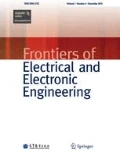Abstract
Sparse decomposition is a new theory in signal processing, with the advantage in that the base (dictionary) used in this theory is over-complete, and can reflect the nature of a signal. Thus, the sparse decomposition of signal can obtain sparse representation, which is very important in data compression. The algorithm of compression based on sparse decomposition is investigated. By training on and learning electrocardiogram (ECG) data in the MITBIH Arrhythmia Database, we constructed an overcomplete dictionary of ECGs. Since the atoms in this dictionary are in accord with the character of ECGs, it is possible that an extensive ECG datum is reconstructed by a few nonzero coefficients and atoms. The proposed compression algorithm can adjust compression ratio according to practical request, and the distortion is low (when the compression ratio is 20:1, the standard error is 5.11%). The experiments prove the feasibility of the proposed compression algorithm.
Similar content being viewed by others
References
Cheng W, Fang B, Shen Y. A new ECG compression method based on 2-step VQ of DCT coefficients. Chinese Journal of Biomedical Engineering, 2005, 24(6): 690–695 (in Chinese)
Kou P, Fang B, Shen Y. A reconstruction quality controlled compression algorithm for ECG signal. Beijing Biomedical Engineering, 2004, 23(2): 109–111 (in Chinese)
Wang X Y, Meng J. Hybrid 2-D ECG compression method based on wavelet transform. Acta Biophysica Sinica, 2006, 22(3): 217–224 (in Chinese)
Alesanco A, Olmos S, Istepanian R, Garcia J. A novel real-time multilead ECG compression and de-noising method based on the wavelet transform. In: Proceedings of Computers in Cardiology, 2003, 593–596
Mallat S G, Zhang Z F. Matching pursuits with time-frequency dictionaries. IEEE Transactions on Signal Processing, 1993, 41(12): 3397–3415
Pati Y C, Rezaiifar R, Krishnaprasad P S. Orthogonal matching pursuits: recursive function approximation with applications to wavelet decomposition. In: Proceedings of the 27th Asilomar Conference in Signals, Systems and Computers. California: IEEE Computer, 1993: 1–5
Aharon M, Elad M, Bruckstein A M. K-SVD: an algorithm for designing of overcomplete dictionaries for sparse representation. IEEE Transactions on Signal Processing, 2006, 54(11): 4311–4322
Chen S S, Donoho D L, Saunders M A. Atomic decomposition by basis pursuit. SIAM Review, 2001, 43(1): 129–159
Kreutz-Delgado K, Murray J F, Rao B D, Engan K, Lee T W, Sejnowski T J. Dictionary learning algorithms for sparse representation. Neural Computation, 2003, 15(2): 349–396
Author information
Authors and Affiliations
Corresponding author
Additional information
__________
Translated from Chinese Journal of Biomedical Engineering, 2008, 27 (1): 13–17 [译自: 中国生物医学工程学报]
About this article
Cite this article
Wang, C., Liu, J. & Sun, J. Compression algorithm for electrocardiograms based on sparse decomposition. Front. Electr. Electron. Eng. China 4, 10–14 (2009). https://doi.org/10.1007/s11460-009-0009-y
Published:
Issue Date:
DOI: https://doi.org/10.1007/s11460-009-0009-y




